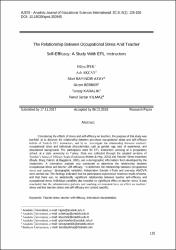The Relationship between Occupational Stress and Teacher Self-Efficacy: A Study with EFL Instructors

Göster/
Erişim
info:eu-repo/semantics/openAccessTarih
2018Yazar
İpek, HülyaAkçay, Aslı
Atay, Sibel Bayındır
Berber, Gizem
Karalık, Tuncay
Yılmaz, Serdar Temel
Üst veri
Tüm öğe kaydını gösterÖzet
Considering the effects of stress and self-efficacy on teachers, the purpose of this study was twofold; a) to discover the relationship between perceived occupational stress and self-efficacy beliefs of Turkish EFL instructors, and b) to investigate the relationship between teachers' occupational stress and individual characteristics such as gender, age, year of experience, and educational background. The participants were 84 EFL instructors working at a preparatory school, at a state university in Turkey. Data was collected through the adapted versions of Teacher's Sense of Efficacy Scale (Tschannen-Moran & Hoy, 2001) and Teacher Stress Inventory (Boyle, Borg, Falzon, & Bagglioni, 1995), and a demographic information form developed by the researchers. A correlation analysis was conducted to determine the relationship between occupational stress and teacher self-efficacy. To determine the relationship between occupational stress and teachers' demographic variables, Independent Sample t-Tests and one-way ANOVA were carried out. The findings indicated that the participants experienced moderate levels of stress, and that there was no statistically significant relationship between teacher self-efficacy and occupational stress. Individual variables also revealed no significant effect on teacher stress. It was concluded that the administrative policies and teaching environment have an effect on teachers' stress and that teachers stress and self-efficacy are context specific. Considering the effects of stress and self-efficacy on teachers, the purpose of this study was twofold; a) to discover the relationship between perceived occupational stress and self-efficacy beliefs of Turkish EFL instructors, and b) to investigate the relationship between teachers' occupational stress and individual characteristics such as gender, age, year of experience, and educational background. The participants were 84 EFL instructors working at a preparatory school, at a state university in Turkey. Data was collected through the adapted versions of Teacher's Sense of Efficacy Scale (Tschannen-Moran & Hoy, 2001) and Teacher Stress Inventory (Boyle, Borg, Falzon, & Bagglioni, 1995), and a demographic information form developed by the researchers. A correlation analysis was conducted to determine the relationship between occupational stress and teacher self-efficacy. To determine the relationship between occupational stress and teachers' demographic variables, Independent Sample t-Tests and one-way ANOVA were carried out. The findings indicated that the participants experienced moderate levels of stress, and that there was no statistically significant relationship between teacher self-efficacy and occupational stress. Individual variables also revealed no significant effect on teacher stress. It was concluded that the administrative policies and teaching environment have an effect on teachers' stress and that teachers stress and self-efficacy are context specific.
Kaynak
Anadolu Üniversitesi Eğitim Bilimleri Enstitüsü DergisiCilt
8Sayı
1Bağlantı
http://www.trdizin.gov.tr/publication/paper/detail/TWpjMk5EQXlNZz09https://hdl.handle.net/11421/10989
Koleksiyonlar
- Makale Koleksiyonu [791]
- TR-Dizin İndeksli Yayınlar Koleksiyonu [3512]

















